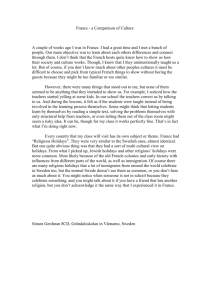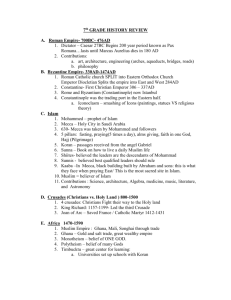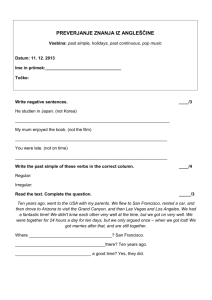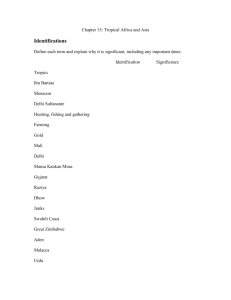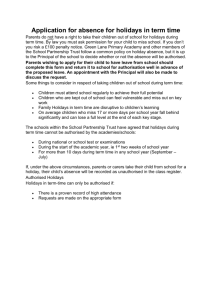In-class essay exam
advertisement
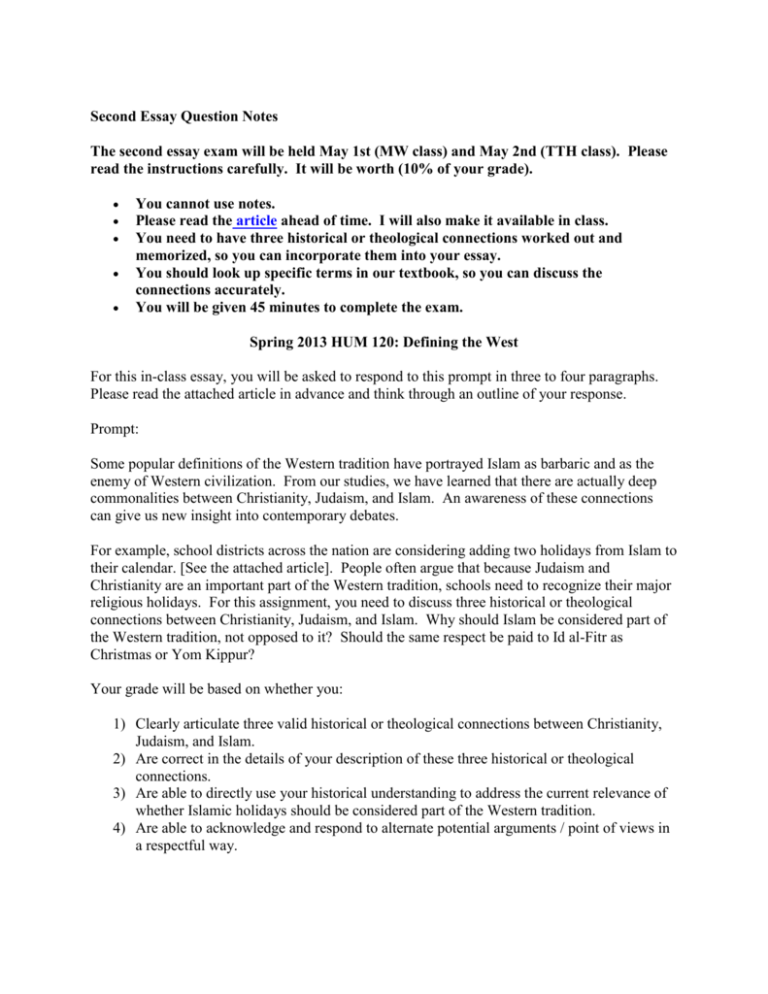
Second Essay Question Notes The second essay exam will be held May 1st (MW class) and May 2nd (TTH class). Please read the instructions carefully. It will be worth (10% of your grade). You cannot use notes. Please read the article ahead of time. I will also make it available in class. You need to have three historical or theological connections worked out and memorized, so you can incorporate them into your essay. You should look up specific terms in our textbook, so you can discuss the connections accurately. You will be given 45 minutes to complete the exam. Spring 2013 HUM 120: Defining the West For this in-class essay, you will be asked to respond to this prompt in three to four paragraphs. Please read the attached article in advance and think through an outline of your response. Prompt: Some popular definitions of the Western tradition have portrayed Islam as barbaric and as the enemy of Western civilization. From our studies, we have learned that there are actually deep commonalities between Christianity, Judaism, and Islam. An awareness of these connections can give us new insight into contemporary debates. For example, school districts across the nation are considering adding two holidays from Islam to their calendar. [See the attached article]. People often argue that because Judaism and Christianity are an important part of the Western tradition, schools need to recognize their major religious holidays. For this assignment, you need to discuss three historical or theological connections between Christianity, Judaism, and Islam. Why should Islam be considered part of the Western tradition, not opposed to it? Should the same respect be paid to Id al-Fitr as Christmas or Yom Kippur? Your grade will be based on whether you: 1) Clearly articulate three valid historical or theological connections between Christianity, Judaism, and Islam. 2) Are correct in the details of your description of these three historical or theological connections. 3) Are able to directly use your historical understanding to address the current relevance of whether Islamic holidays should be considered part of the Western tradition. 4) Are able to acknowledge and respond to alternate potential arguments / point of views in a respectful way. July 1, 2009 Council Votes for Two Muslim School Holidays By KIRK SEMPLE Spurred by a broad coalition of religious, labor and immigrant groups, the City Council overwhelmingly passed a resolution on Tuesday to add two of the most important Muslim holy days to the public schools’ holiday calendar. But the vote, which was nonbinding, put the Council in conflict with Mayor Michael R. Bloomberg, who has the final say to designate the days off and has said he is resolutely opposed to the idea. The mayor told reporters before the vote that not all religions could be accommodated on the holiday schedule, only those with “a very large number of kids who practice.” “If you close the schools for every single holiday, there won’t be any school,” he said. “Educating our kids requires time in the classroom, and that’s the most important thing to us.” The current school calendar recognizes major Christian and Jewish holy days like Christmas and Yom Kippur, but no Muslim holy days. Mr. Bloomberg’s stance has irritated advocates of the measure, and some said he risked alienating many in New York’s fast-growing Muslim population as he seeks re-election in the fall. Imam Talib Abdur-Rashid, a leader of the campaign to add the holidays, said that if the mayor continued to oppose the move, the results for him at the voting booth could be “catastrophic” among the city’s roughly 600,000 Muslims. “We really have confidence in the mayor’s intelligence,” said Imam Talib, head of the Mosque of Islamic Brotherhood in Harlem. “It’s an election year.” The proposal to add the two holy days — Id al-Fitr and Id al-Adha — has not drawn much visible public opposition. Some council members have expressed reservations about subtracting more classroom days from the school calendar, though only one, G. Oliver Koppell of the Bronx, voted against it. After the vote, Mr. Koppell said the existing schedule of religious holidays might have to be reviewed and trimmed, lest other growing religions in New York start demanding their own days off. “Where are we going to end with this?” he asked. The resolution’s advocates said that since about 12 percent, or more than 100,000, of the city’s public school students are Muslim, they deserved recognition. The two holidays have already been adopted by school districts including Dearborn, Mich., and several municipalities in New Jersey. Supporters also say that since the Ids (pronounced eeds) are floating holidays whose timing is set by the lunar calendar, they often fall on other religious holidays, on weekends or during the summer. During the next decade, for instance, at least one of the two Ids each year is expected to coincide with summer recess or an existing school holiday, according to a report by the Immigrant Rights Clinic at New York University. It was unclear on Tuesday whether Mr. Bloomberg would continue to have final say on the issue, because the State Legislature still has not passed a bill to extend his control over the schools. But some officials said that even if the bill did not pass, he would be able to exert indirect control through appointments to the Board of Education. The Council resolution also urged the Legislature to pass two pending bills that would amend state education law to require the holidays in the city’s school calendar. That could allow the move without the mayor’s approval, said Councilman Robert Jackson of Manhattan, a cosponsor of the resolution and a Muslim. Id al-Fitr celebrates the end of Ramadan, the sacred month of fasting, and Id al-Adha, the Festival of Sacrifice, marks the end of the annual pilgrimage to Mecca. Muslims traditionally observe these days by praying in the morning, then celebrating with family and friends, exchanging gifts and sharing a large meal. The holy days have long posed a painful choice for Muslim students: Should they go to class in the interest of their grades and attendance record, or cut class to be with their families? When Rebecca Chowdhury, 18, was young, she said, she generally skipped school. But as she grew older and faced more academic demands, she often had to forgo the celebrations. “It created a great divide between myself and my family,” said Ms. Chowdhury, who graduated last week from Stuyvesant High School. The campaign to recognize the two holy days has been coordinated by La Fuente, a grass-roots organizing group, and supported by a coalition; at its core are dozens of Muslim organizations. Some leaders said the coalition’s successes reflected the political maturation of the city’s diverse Muslim population, which has at times seen its social and political ambitions hamstrung by schisms among competing groups. “When there are issues of common concern and broad-based impact,” Imam Talib said, “the people put aside other differences and unite around a common cause.” Members of the coalition said the current effort stems from a decision by the state in 2006 to schedule the Regents exam on Id al-Adha, which angered Muslims and spurred state legislators to pass a bill ordering the State Department of Education to make a “bona fide effort” to schedule mandated exams on days other than religious holidays. While there have been scattered efforts for years to put the Id holy days on school calendars, the efforts finally coalesced into a formal campaign after the passage of the state bill.



